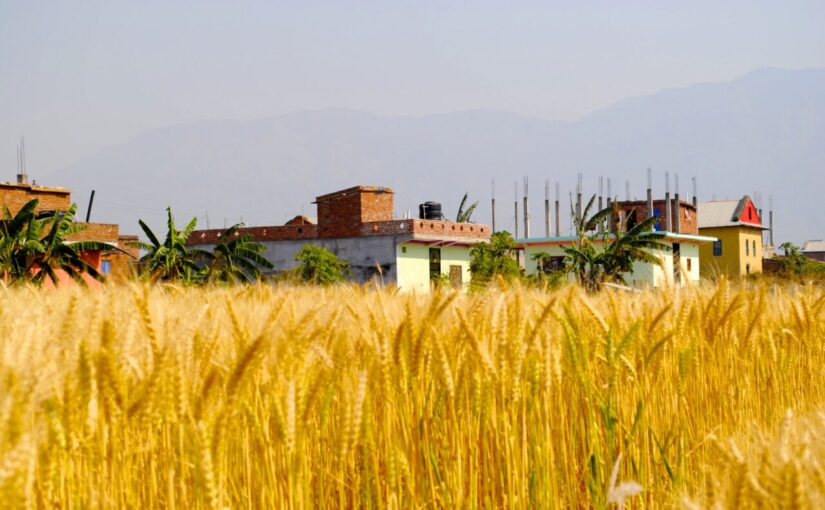Stella Nwawulu Chiemela, Interdisciplinary Global Development Centre, University of York, UK
As an IGDC postgraduate research student working on food systems, I’ve embarked on a journey that has opened my eyes to the intricate tapestry of our global food landscape. As I have delved into the literature, I’ve been struck by the diversity of voices and experiences that shape our food systems. From the lush rice paddies of Southeast Asia to the arid pastures of sub-Saharan Africa, each region has its own tale to tell – of triumphs and tribulations, of traditions upheld and livelihoods threatened. But the narrative doesn’t end there. In the rolling hills of Europe, the sprawling plains of North America, and the vibrant markets of Latin America, similar stories unfold – stories of resilience in the face of adversity, of innovation born out of necessity, and of communities coming together to tackle shared challenges.
Beyond the anecdotes lies a deeper truth: food systems are not just about food. They are about people – their cultures, their livelihoods, and their aspirations. By adopting a holistic approach that considers the social, cultural, economic, political and environmental dimensions of food production and consumption, we can unlock new pathways to empowerment and building resilience.
Yet, this journey is not without its challenges. The complexity of food systems — the myriad of actors, processes, and dynamics at play – can be daunting to unravel. Climate change, land degradation, biodiversity loss, resource use, and socio-political conflicts further exacerbate the complexity, creating ripple effects that reverberate across continents.
Food systems encompass the intricate networks of dynamic processes involved in the production, processing, distribution, consumption, loss, and waste of food (Mbow et al. 2019), which includes the interactions between these processes and the socio-economic and environmental contexts in which they occur (Wezel at al. 2020). The changing landscape of food systems is increasingly shaped by environmental change (including climate change), which poses significant threats to food and nutritional security and necessitates transformative approaches to research, governance and policymaking.
This is where systems thinking comes to the fore. Scholars such as Jessica Fanzo (2023), Wei Zang and colleagues (2018), and Molly Anderson and colleagues’ work for IPES Food (2017) have advocated for a paradigm shift towards systems thinking in food policy and research, emphasising the need to understand the interconnectedness of food systems and their broader socio-economic and environmental contexts. By viewing food systems as dynamic, interconnected networks rather than isolated components, we gain a deeper understanding of the underlying structures and feedback loops that shape their behaviour. Mbow et al. (2019) in the 2019 IPCC report on the impact of climate change on food systems through altered crop yields, livestock productivity, and fisheries and how these changes affect food availability, access, prices, and utilisation. From my research perspective and fieldwork in Nigeria, farmer-herder conflicts exemplify the interconnectedness of food systems by highlighting the tensions between crop cultivation and livestock rearing, which compete for scarce resources like land and water. These conflicts disrupt food production, market access, and prices, illustrating how disruptions in one component of the food system have cascading effects on others or the whole system.
But perhaps the most powerful lesson I’ve learned on this journey is the importance of amplifying the voices of those who are often marginalised in decision-making processes: the farmers, and the herders. During my field research and extensive analysis of secondary sources, I encountered numerous instances where the perspectives of marginalised groups, such as the poor and primary stakeholders, were overlooked in policy planning, implementation, and conflict resolution efforts, subsequently leading to the ineffectiveness of those efforts. By centering their perspectives and experiences, we not only gain valuable insights into the challenges they face but also empower them to co-create solutions that are rooted in their realities.
And I am not alone in this realisation. Scholars, policymakers, and practitioners alike are increasingly recognising the imperative of adopting a food systems approach that is inclusive, participatory, and holistic, especially for building resilience in African food systems (Global Panel, 2025). From the corridors of academia to the halls of international organisations, there is a growing consensus that meaningful change can only come from engaging with diverse stakeholders and embracing their knowledge systems.
As I continue on this path of exploration and discovery, I am reminded of the profound impact that understanding food systems can have not just on policy agendas and academic discourse, but on the lives of millions around the world. Embarking on this journey of empathy, empowerment, and enlightenment in the context of food systems is an honour and a responsibility. As I dig deeper into my PhD research, I invite you to join me in embracing a holistic food systems approach by staying tuned to the upcoming findings and articles from my work.
Together, let us unravel the tapestry of food systems – one thread at a time – and weave a future that nourishes both people and planet, guided by the collective wisdom of all those who call this Earth home.
References
Fanzo, J. (2023). Achieving Food Security Through a Food Systems Lens. In Resilience and Food Security in a Food Systems Context. Edited Christophe Béné and Stephen Devereux: 10.1007/978-3-031-23535-1_2. Chapter 2, 31-51.
IPES-Food. (2017). Unravelling the Food–Health Nexus: Addressing practices, political economy, and power relations to build healthier food systems. The Global Alliance for the Future of Food and IPES-Food.
Global Panel (2025). Building resilience and enhancing nutrition in Africa’s food systems. https://www.glopan.org/brief/africaresilience/
Mbow, C., C. Rosenzweig, L.G. Barioni, T.G. Benton, M. Herrero, M. Krishnapillai, E. Liwenga, P. Pradhan, M.G. Rivera-Ferre, T. Sapkota, F.N. Tubiello, Y. Xu, (2019). Food Security. In: Climate Change and Land: an IPCC special report on climate change, desertification, land degradation, sustainable land management, food security, and greenhouse gas fluxes in terrestrial ecosystems [P.R. Shukla, J. Skea, E. Calvo Buendia, V. Masson-Delmotte, H.-O. Pörtner, D.C. Roberts, P. Zhai, R. Slade, S. Connors, R. van Diemen, M. Ferrat, E. Haughey, S. Luz, S. Neogi, M. Pathak, J. Petzold, J. Portugal Pereira, P. Vyas, E. Huntley, K. Kissick, M. Belkacemi, J. Malley, (eds.)]. https://doi.org/10.1017/9781009157988.007
Wezel, A., Herren, B., Kerr, R., Barrios, E., Gonçalves, A., and Sinclair, F. (2020). Agroecological principles and elements and their implications for transitioning to sustainable food systems. a review. Agronomy for Sustainable Development, 40(6). https://doi.org/10.1007/s13593-020-00646-z
Zhang, W., Gowdy, J., Bassi, A.M., Santamaria, M., DeClerck, F., Adegboyega, A., Andersson, G.K.S., Augustyn, A.M., Bawden, R., Bell, A., Darknhofer, I., Dearing, J., Dyke, J., Failler, P., Galetto, L., Hernández, C.C., Johnson, P., Jones, S.K., Kleppel, G., Komarek, A.M., Latawiec, A., Mateus, R., McVittie, A., Ortega, E., Phelps, D., Ringler, C., Sangha, K.K., Schaafsma, M., Scherr, S., Hossain, M.S., Thorn, J.P.R., Tyack, N., Vaessen, T., Viglizzo, E., Walker, D., Willemen, L. and Wood, S.L.R. (2018). Systems thinking: an approach for understanding ‘eco-agri-food systems’. In TEEB for Agriculture & Food: Scientifc and Economic Foundations. Geneva: UN Environment. Chapter 2, 17-55.

